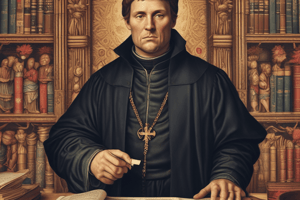Podcast
Questions and Answers
Which movement aimed to reform the practices of the Catholic Church in the 16th century?
Which movement aimed to reform the practices of the Catholic Church in the 16th century?
- The Scientific Revolution
- The Counter-Reformation
- The Reformation (correct)
- The Enlightenment
What was a significant outcome of the Counter-Reformation?
What was a significant outcome of the Counter-Reformation?
- Strengthening of monastic life
- The establishment of Protestant churches
- A decrease in religious warfare
- Increased persecution of religious minorities (correct)
What was a consequence of the religious warfare in Europe during the Reformation period?
What was a consequence of the religious warfare in Europe during the Reformation period?
- Division of territories along religious lines (correct)
- Creation of lasting peace treaties
- Political unification of European states
- Widespread secularization of society
Which of the following best describes the main focus of the Enlightenment?
Which of the following best describes the main focus of the Enlightenment?
During the Reformation, why did some rulers support Martin Luther's ideas?
During the Reformation, why did some rulers support Martin Luther's ideas?
Flashcards
Protestant Reformation
Protestant Reformation
The Protestant Reformation was a religious movement in the 16th century that challenged the authority of the Catholic Church and resulted in the formation of new Protestant denominations.
Counter-Reformation
Counter-Reformation
The Counter-Reformation was the Catholic Church's response to the Protestant Reformation. It involved reforms within the Catholic Church and efforts to suppress Protestantism.
Religious Warfare in Europe
Religious Warfare in Europe
Religious warfare in Europe during the 16th and 17th centuries was a series of conflicts between Catholic and Protestant states, often sparked by religious differences.
Consequences of Reformation and Counter-Reformation
Consequences of Reformation and Counter-Reformation
Signup and view all the flashcards
Martin Luther
Martin Luther
Signup and view all the flashcards
Study Notes
The Transformation of Europe: Political Change (16th Century)
- Spain and Portugal gained dominance after discovering the Americas
- The Holy Roman Empire's universal power diminished, leading to conflicts and opportunities for other powers (France, England, and the Netherlands)
- Rivalry and jealousy arose between European powers over Atlantic trade routes and resources
- Pirates attacked Spanish ships, aiming to seize their cargo
- The French, English, and Dutch failed to find significant gold or silver in their colonies, contrasting with Spain's finds
- Spain's dominance as the power of the Atlantic world began to decline due to constant warfare.
The Transformation of Europe: Religious Change (Protestant Reformation)
- Martin Luther, a German monk and professor, criticized the Catholic Church
- He emphasized that salvation comes from faith in God and criticized practices like indulgences.
- Luther's ideas challenged the authority of the Pope and the Catholic Church.
- Luther's translation of the Bible into German promoted public literacy and spread his ideas widely.
- The printing press played a pivotal role in spreading Protestant ideas, reaching a broad audience.
- Luther's ideas inspired the development of new Protestant denominations and sects (Calvinism, Presbyterianism, Anglicanism, etc.)
Counter-Reformation and Persecution
- The Council of Trent (1545-1563) affirmed Catholic doctrines and practices, responding to the Protestant Reformation.
- The Catholic Church continued to persecute people who challenged its authority.
- New religious wars occurred as a result of religious disagreements and conflict
- This period witnessed intolerance towards different faiths as the period of the Reformation progressed
Studying That Suits You
Use AI to generate personalized quizzes and flashcards to suit your learning preferences.
Related Documents
Description
Explore the major political and religious transformations in Europe during the 16th century. From the rise of Spain and Portugal to the impact of the Protestant Reformation led by Martin Luther, this quiz covers significant events and shifts that shaped Europe. Test your knowledge on how these changes influenced societal structures and power dynamics.




